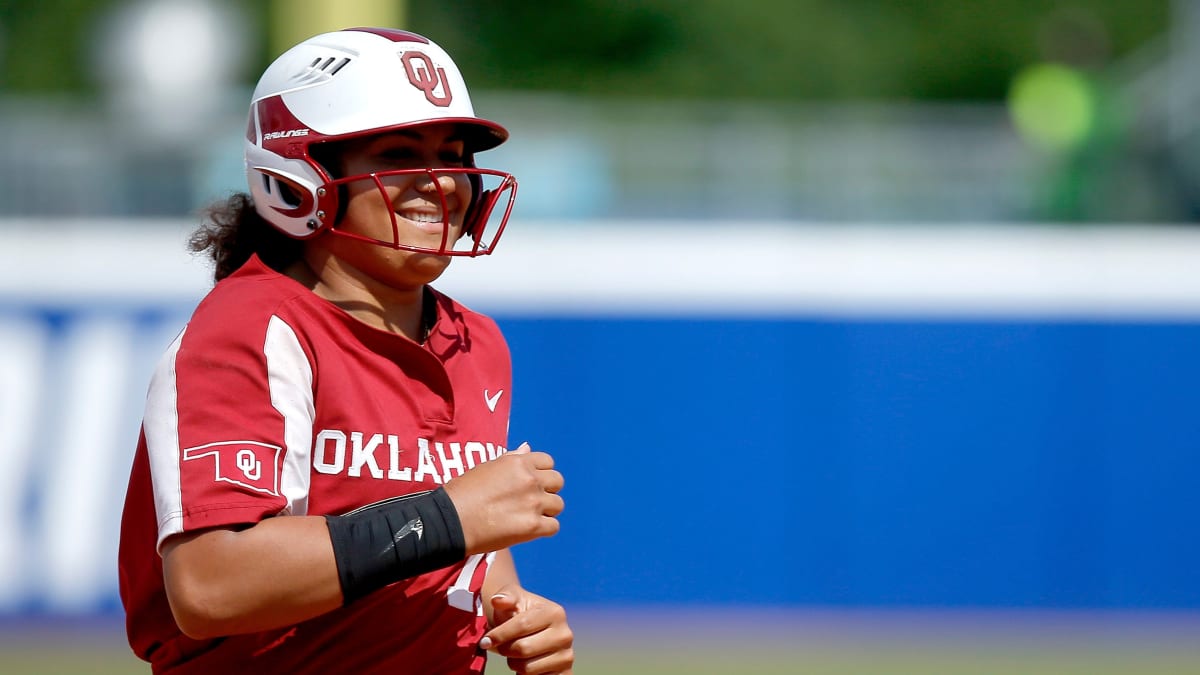For Jocelyn Alo’s 10th birthday, her father gave her a poster of the 2008 U.S. Olympic softball team. She hung it up in her bedroom, where she could memorize the names and faces of the roster, dreaming that she might one day be one of them.
“That was the goal,” Alo said. “It’s always been the goal.”
Alo grew up to be arguably the best college hitter the game has ever seen. She graduated from Oklahoma in 2022 as the NCAA home run queen, the all-time leader in slugging percentage and total bases and a two-time champion at the Women’s College World Series. She made her way to international competition with Team USA.
But Alo’s original dream of the Olympics? That was out of reach. The 2008 Games were the last to include softball as a standard part of the Olympics program. The sport was gone in ‘12 and ‘16, back at the request of host nation Japan for ‘20, and left off again for ‘24. But this week brought some joyous news for the sport.
Softball will be back in the Olympics with Los Angeles in 2028.
“For us to be at the Olympics, on literally the biggest stage, is huge,” Alo said. “I can’t even put it into words. It’s just—I’m speechless trying to comprehend and wrap my head around the fact that I could actually be playing in the Olympics.”
The sport joined baseball, lacrosse, squash, cricket and flag football as additions for the L.A. Games in a vote conducted by the IOC on Monday.
Softball’s original tenure in the Olympics, from 1996 to 2008, helped boost the popularity of the sport and opened the door to stardom for players like Jennie Finch and Cat Osterman. (Both were on that poster in Alo’s childhood bedroom.) It helped establish an electric rivalry between the U.S. and Japan. The guarantee of Olympic attention can be big for any sport, even if the Games in question are still half a decade away. But it feels especially crucial at this moment for softball.

Sarah Phipps/The Oklahoman/USA TODAY NETWORK
There’s been dramatic growth in recent years in the college game. The last few Women’s College World Series have set viewership records and outdrawn the men at the College World Series. But the landscape can still feel precarious for players who stick with the sport after college. National Pro Fastpitch shuttered during the pandemic. There are now two leagues in its place: Athletes Unlimited and Women’s Professional Fastpitch. Yet pro softball is still a part-time, supplementary gig for most players, rather than a full-time focus, and there’s little available in the way of long-term commitment. It can be difficult to navigate even for star players—and forget about having freedom or flexibility to plan ahead. For softball to be in the Olympics, then, is more than just a chance for the sport to occupy a grand stage. It’s a way for the game to anchor itself in the future.
Just take the message shared on Instagram by former Florida pitcher Aleshia Ocasio when she saw the Olympic news on Monday:
“Guess I’m going to be sticking around.”
It was a little tongue-in-cheek: Ocasio, 27, says she’d already been planning to play the next few years. But the Olympic announcement solidified that. Ocasio has posted a 3.00 ERA in four seasons with Athletes Unlimited and was named the best player in the league in 2021. A College World Series champion in 2015, she’s never lacked for motivation. But the Olympics give a new kind of structure to her professional goals.
Ocasio has played for Team Puerto Rico since she was a teenager and has helped them win medals at tournaments like the Pan-American Games. But the island’s softball team last appeared at the Olympics in 1996—the year she was born. She knows there are countless contingencies for an event five years away, both for herself and for the team, perhaps most obviously the process of qualification. (That was a heartbreaker for Puerto Rico ahead of 2020: The 12-team Americas Qualifying Event gave Olympic berths to the top two national teams of the tournament. Puerto Rico finished third.) But to be able just to dream about the possibility feels like a win.
“To be able to say that I’m an Olympian and be able to wear Puerto Rico across my chest… I think it would just be such an honor to be able to represent something so much bigger than myself,” Ocasio said.
Alo, Ocasio and their fellow players see how softball has grown on the college level. They see the scope of the moment for women’s sports more broadly. And they believe pro softball could be next with the right investment and attention.
“Sometimes I feel like when you get into pro softball, you kind of fall off the face of the earth, almost,” said Alo, who plays for the Oklahoma City Spark of WPF. “There’s more room for us to grow.”
That message is echoed by Ocasio.
“I’m grateful for the opportunity to play and to be able to play professionally,” she said. “But I want more.”
They hope the Olympics can set the stage for that. In the meantime, they have something to work toward.
“I want to just continue to pour into my game and get better and better, so come 2028 and the Olympics, I can be fully prepared,” Alo said. “It’s just something to look forward to. Now there are stepping stones.”







